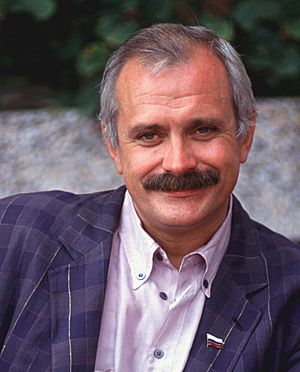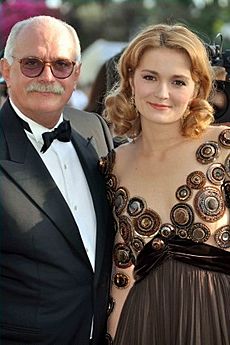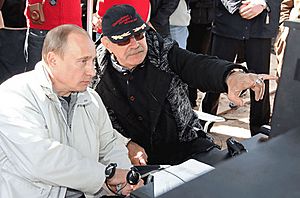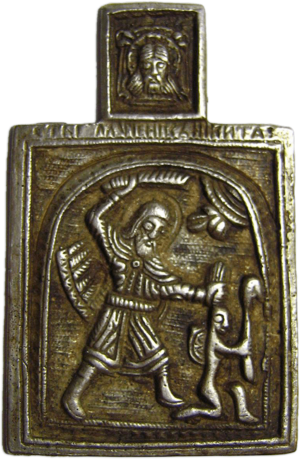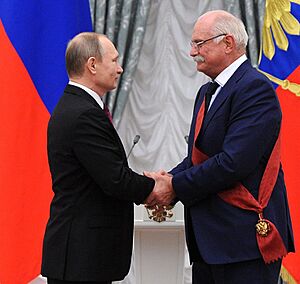Nikita Mikhalkov facts for kids
Quick facts for kids
Nikita Mikhalkov
|
|
|---|---|
| Никита Михалков | |
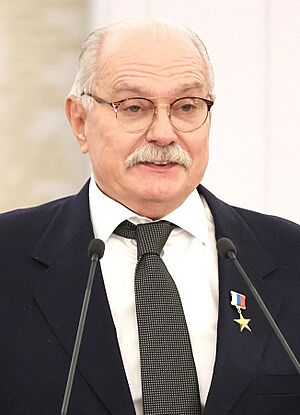
Mikhalkov in 2022
|
|
| Born | 21 October 1945 Moscow, Soviet Union
|
| Occupation |
|
| Years active | 1959–present |
| Spouse(s) |
Anastasiya Vertinskaya
(m. 1966–1971)Tatiana Mikhalkova
(m. 1973) |
| Children | 4, including Anna and Nadezhda |
| Parent(s) |
|
| Relatives | Andrei Konchalovsky (brother) |
Nikita Sergeyevich Mikhalkov (born 21 October 1945) is a famous Russian filmmaker and actor. He started directing movies with the Western-style film At Home Among Strangers (1974). Before that, he acted in many films. Some of his early acting roles were in Walking the Streets of Moscow (1964) and The Red and the White (1967).
Mikhalkov's later films include the romantic comedy A Slave of Love (1976) and the drama An Unfinished Piece for Mechanical Piano (1977). He also directed Dark Eyes (1987). For his adventure drama Close to Eden (1991), he won the Golden Lion award at the Venice Film Festival. He was also nominated for an Academy Award for this film.
After the Soviet Union ended, Mikhalkov directed and starred in Burnt by the Sun (1994). This historical drama won the Grand Prix at the Cannes Film Festival and an Academy Award for Best Foreign Language Film. He also received a special award at the Venice Film Festival for his work in cinema. His film 12 (2007) was nominated for an Academy Award.
Mikhalkov has won the State Prize of the Russian Federation three times. He has also received the Order "For Merit to the Fatherland."
Contents
Career Highlights
Starting as an Actor
Nikita Mikhalkov began his acting journey at a young age. He studied at the children's studio of the Moscow Art Theatre. Later, he attended the Shchukin School. While still a student, he appeared in films like Walking the Streets of Moscow (1964). He quickly became a well-known actor in Soviet movies.
Becoming a Director
Even while acting, Mikhalkov decided to study directing. He went to VGIK, the state film school in Moscow. His teacher was the famous filmmaker Mikhail Romm. Mikhalkov directed his first short films in the late 1960s and early 1970s.
He had acted in over 20 films before directing his first full-length movie. This was At Home Among Strangers in 1974. It was a Western-style film set after the 1920s civil war in Russia.
Mikhalkov gained international fame with his second film, A Slave of Love (1976). This movie is set in 1917, during the Russian Revolution. It tells the story of a film crew trying to make a silent movie while the revolution happens around them. The film was highly praised, especially in the U.S.
His next film, An Unfinished Piece for Mechanical Piano (1977), was based on an early play by Anton Chekhov. It won first prize at the San Sebastián International Film Festival. In 1978, he made Five Evenings, a love story about a couple separated by World War II. They meet again after many years.
Mikhalkov's film A Few Days from the Life of I. I. Oblomov (1980) is based on a classic novel. It's about a lazy young nobleman who struggles to leave his bed. Family Relations (1981) is a comedy about a woman visiting Moscow and dealing with her relatives. Without Witness (1983) shows a long conversation between a woman and her ex-husband. This film won an award at the Moscow International Film Festival.
In the early 1980s, Mikhalkov also continued his acting. He appeared in popular films like Station for Two (1982) and A Cruel Romance (1984). He also played Henry Baskerville in the Soviet film version of The Hound of the Baskervilles. He often acted in his own films too.
Achieving International Recognition
Dark Eyes (1987) was a film that combined several short stories by Chekhov. It starred Marcello Mastroianni, who won the Best Actor Prize at the Cannes Film Festival for his role.
Mikhalkov's next film, Urga (1992), also known as Close to Eden, was set in Mongolia. It won the Golden Lion at the Venice Film Festival and was nominated for an Academy Award for Best Foreign Language Film. His film Anna: 6–18 (1993) is a documentary. It follows his daughter Anna as she grows up.
Mikhalkov's most famous film is Burnt by the Sun (1994). This movie showed the difficult times of Joseph Stalin's Great Terror. The film won the Grand Prize at Cannes and the Academy Award for Best International Feature Film. It became the highest-earning film from the former Soviet Union.
In 1996, he was the head of the jury at the Berlin International Film Festival.
Later Career
After the success of Burnt by the Sun, Mikhalkov made The Barber of Siberia (1998). This was a large-scale film designed for Russian audiences. It starred Julia Ormond and Oleg Menshikov, who often appears in Mikhalkov's movies. Mikhalkov himself played Tsar Alexander III.
He also became involved in leading the Russian film industry. He was elected President of the Russian Society of Cinematographers. He has also managed the Moscow Film Festival since 2000.
In 2005, Mikhalkov returned to acting. He starred in films like The Councillor of State and Dead Man's Bluff.
In 2007, Mikhalkov directed and starred in 12. This film was a Russian version of the court drama 12 Angry Men. In September 2007, 12 received a special Golden Lion award at the Venice Film Festival. It was nominated for Best Foreign Language Film at the Academy Awards in 2008.
Mikhalkov presented his film Burnt by the Sun 2 at the Cannes Film Festival in 2010. This film was also selected as Russia's entry for the Best International Feature Film at the Academy Awards in 2011.
Personal Life
Nikita Mikhalkov's first wife was the actress Anastasiya Vertinskaya. They were married from 1966 to 1971 and had a son named Stepan.
His second wife is Tatiana Mikhalkova. They married in 1973. They have a son, Artyom, and two daughters, Anna and Nadezhda. Both Anna and Nadezhda are also actresses.
Involvement in Politics
Mikhalkov has been active in Russian politics. He is known for his Russian nationalist views. He has supported Russian President Vladimir Putin. In 2007, he co-signed a letter asking Putin to stay in office.
In 2015, Mikhalkov was not allowed to enter Ukraine for five years. This was because he supported Russia's actions in Crimea in 2014. However, he also called for the release of a Ukrainian filmmaker who was imprisoned.
In February 2022, he supported Russia's actions in Ukraine. He criticized Russian cultural figures who opposed these actions. In December 2022, the European Union placed sanctions on Mikhalkov. Ukraine also imposed sanctions on him in January 2023.
Online Presence
Nikita Mikhalkov started an online video blog called "Besogon TV" in 2011. He chose the name "Besogon" after his heavenly patron, Nikita the Exorcist. This channel became very popular.
The "Besogon TV" program later started broadcasting on the Rossiya-24 TV channel. It was shown once a month. Sometimes, episodes were not aired due to various reasons. Since 2019, the program has been broadcast on the Spas TV channel.
In May 2020, an episode about Bill Gates and vaccination was removed from Rossiya-24. Mikhalkov then stopped working with that channel but continued his program on YouTube. As of January 2023, his YouTube channel had 1.47 million subscribers.
In January 2024, YouTube blocked the "Besogon TV" channel. This was due to "numerous or serious violations of YouTube's rules regarding discriminatory statements."
Conspiracy Theories
In his "Besogon TV" program, Mikhalkov has shared various conspiracy theories. For example, in May 2020, he talked about Bill Gates' alleged plans to reduce the world's population through vaccination. He also suggested that people might be "chipped" through vaccines.
A journalist named Ilya Varlamov criticized Mikhalkov's statements. He explained that the "Patent 666" Mikhalkov mentioned was about a cryptocurrency system using body activity data, not a microchip implanted through vaccines.
In September 2020, Mikhalkov also shared a conspiracy theory about protests in Belarus. He claimed some photos from the protests were fake.
For his public statements about conspiracy theories, Mikhalkov was nominated for an anti-award called "Honorary Academician LIED" in 2020. He received the "Vroskar Award" for "outstanding directorial and acting talent aimed at spreading delusional ideas."
Awards and Honors
State Awards and Titles
- "Honored Artist of the RSFSR" (1976)
- Lenin Komsomol Award (1978)
- "People's Artist of the RSFSR" (1984)
- Order of Merit for the Fatherland, III degree (1995)
- Certificate of Honor from the Government of the Russian Federation (1995)
- Commendation of the President of the Russian Federation (1996)
- Order of Merit for the Fatherland, II degree (2005)
- Order of Merit for the Fatherland, IV degree (2010)
- Order of Merit for the Fatherland, 1st class (2015)
- Cultural Prize of the Government of the Russian Federation (2020)
- "Hero of Labor of the Russian Federation" (2020)
- Award of the Ministry of Defense of the Russian Federation (2021)
Awards from other countries
- Officer of the Legion of Honor (France, 1992)
- Commander of the Legion of Honor (France, 1994)
- Knight Grand Cross of the Order of Merit of the Italian Republic (Italy, 2004)
- Gold Medal "For Services to Culture Gloria Artis" (Poland, 2005)
- Gold Medal of Merit of the Republic of Serbia (Serbia, 2013)
- Gold Medal of the Mayor of Yerevan (Armenia, 2013)
- Order of Friendship (Azerbaijan, 2015)
- Order of St. Stephen (Serbian Orthodox Church, Montenegro, 2016)
Other awards and titles
- Order of St. Sergius of Radonezh, 1st degree (Russian Orthodox Church)
- Jubilee Order “1020 Years of the Baptism of Kievan Rus” (2008)
- Order of the Holy Blessed Prince Daniel of Moscow, 1st degree (Russian Orthodox Church, 2015)
- Order of St. Seraphim of Sarov, 1st degree (Russian Orthodox Church, 2021)
- Medal "In Commemoration of the 10th Anniversary of the Return of Sevastopol to Russia" (2024)
- Honorary Member of the Russian Academy of Arts
- Certificate of Honor of the Moscow City Duma (2015)
- Honorary degree of Doctor of Science of the International Academy of Sciences and Arts
- Honorary Badge of Moscow State University (1995)
- Grand Prix of the national award "Russian of the Year" (2005)
- "Person of the Year in the Film Business" (2005)
- Mikhail Chekhov Medal (2008)
- National Prize "Imperial Culture" (2009, 2016)
- Honorary Citizen of Belgrade (Serbia, 2015)
- Shostakovich Prize (2017)
- Award "Legends of Tavrida" (2020)
- Honorary Citizen of the Moscow Region (2023)
- Honored Artist of the Chechen Republic (2024)
- Special Prize "For Outstanding Contribution to the Development of Theatre Arts" of the National Theatre Award "Golden Mask" (2025)
Public Roles
Nikita Mikhalkov holds many important public positions. He is a member of the Presidium of the World Russian Council. He is also a member of the Russian Commission for UNESCO.
Since 1993, he has been the President of the Russian Cultural Foundation. He is also a member of the Council under the President of the Russian Federation for Culture and Arts. He serves on the Expert Council under the Ministry of Culture of the Russian Federation.
Mikhalkov is the President of the Moscow International Film Festival. He is an Academician of the National Academy of Cinematographic Arts and Sciences of Russia. He is also a member of the European Film Academy.
He is an Honorary Professor of VGIK, the state film school. He is the Chairman of the Board of Trustees for the "Saint Anna" film competition. From 2004 to 2011, he was the Chairman of the Public Council under the Ministry of Defense of the Russian Federation. Since 2018, he has been a Mentor of the "Younarmy" public movement.
Filmography
| Year | Film | |||||
|---|---|---|---|---|---|---|
| Director | Screenwriter | Producer | Role | Notes | ||
| 1959 | The sun is shining on everyone | schoolboy | first movie role; not in the credits | |||
| 1960 | Clouds over Borsk | Petya, "Father Nikon" in a school anti-religious skit | ||||
| 1961 | The Adventures of Krosh | Vadim, Igor's friend | ||||
| My friend, Kolka! | schoolboy | not in the credits | ||||
| 1964 | I'm walking through Moscow | Nikolay | ||||
| Wick No. 29 (the plot is "Not according to the instructions") | subway passenger | short film | ||||
| 1965 | A year like life | Jules | ||||
| Roll call | Sergey Borodin | |||||
| 1966 | A joke | A. P., the narrator in his youth | short film | |||
| Not a good day. | Nikita | |||||
| 1967 | Stars and soldiers | Glazunov, ensign | ||||
| War and Peace | Episode | He was approved for the role of Petya Rostov, but starred in only one scene — horseback riding during a hunt, after which he did not participate in the film; there is no credits | ||||
| Devochka i veshchi | short film, term paper | |||||
| And this lips, and green eyes… | short film, term paper | |||||
| 1968 | And I Go Home | short film, term paper | ||||
| 1969 | The noble Nest | Prince Nelidov | ||||
| The Song of Manshuk | Valery Yezhov | |||||
| The Red Tent | Boris Chukhnovsky | |||||
| 1970 | Sports, sports, sports | Kiribeevich, an oprichnik | ||||
| Risk | ||||||
| A quiet day at the end of the war | short film, thesis | |||||
| Wick No. 94 (the plot of "Dear words") | short film | |||||
| Wick No. 97 (the plot of "Fly in the Ointment") | short film | |||||
| Wick No. 98 (the plot is "Unconscious") | short film | |||||
| 1972 | The stationmaster | Minsky, the hussar | ||||
| Chocolate | a short promotional film | |||||
| Wick No. 125 (the plot "Victim of hospitality") | short film | |||||
| 1974 | Wick No. 148 (the "Object Lesson" story) | short film | ||||
| Wick No. 150 (the plot "Let's start a new life") | short film | |||||
| At Home Among Strangers | Alexander Brylov, ataman of the gang, former captain | Feature directorial debut | ||||
| 1976 | A Slave of Love | Ivan, the revolutionary underground worker | ||||
| 1977 | An Unfinished Piece for Mechanical Piano | Nikolai Ivanovich Triletsky, doctor, Sashenka's brother | ||||
| Trans-Siberian Express | ||||||
| Hate | ||||||
| 1978 | Siberiade | Alexey Ustyuzhanin, son of Nikolai and Anastasia | ||||
| Five Evenings | ||||||
| 1979 | A Few Days from the Life of I.I. Oblomov | a distinguished gentleman in St. Petersburg | not in the credits as an actor | |||
| 1981 | Family Relations | waiter | ||||
| Two voices | Sergey Nikolaevich Baklazhanov, Professor, library reader | |||||
| Portrait of the artist's wife | Boris Petrovich, deputy director of the boarding house, Nina's boyfriend | |||||
| The Hound of the Baskervilles | Sir Henry Baskerville, nephew and heir of Sir Charles, the last of the Baskervilles | |||||
| 1982 | Station for Two | Andrey, the conductor | ||||
| Traffic police Inspector | Valentin Pavlovich Trunov, Director of the Service Station | |||||
| Flying in a dream and in reality | Director on a night shoot (cameo) | |||||
| 1983 | Without Witness | |||||
| 250 grams — radioactive testament | Max Seman, architect | |||||
| 1984 | A cruel romance | Sergey Sergeevich Paratov, hereditary nobleman, owner of a shipping company | ||||
| 1986 | My favorite clown | |||||
| 1987 | Dark Eyes | |||||
| 1988 | Wick No. 310 (the plot of "The Forgotten Tapes?") | short film | ||||
| 1989 | The Lonely Hunter | |||||
| 1990 | Hitchhiking | It was made with money from an advertising contract with the Fiat concern | ||||
| Under the Northern Lights | ||||||
| 1991 | Humiliated and insulted | Prince Valkovsky | ||||
| Close to Eden | Cyclist on a Chinese city street (cameo) | |||||
| 1992 | The beautiful stranger | The Colonel | ||||
| 1993 | Remembering Chekhov | The film was not completed | ||||
| Anna: 6 - 18 | cameo | documentary film-biography | ||||
| 1994 | Burnt by the Sun | Sergey Petrovich Kotov, Division Commander | ||||
| 1995 | A sentimental trip to my homeland. Music of Russian painting | cameo | documentary and educational series | |||
| 1996 | The Auditor | Anton Antonovich Draughtsman-Dmukhanovsky, mayor | ||||
| Russian project | Senior cosmonaut | social advertising of the ORT TV channel | ||||
| 1997 | Schizophrenia | cameo | ||||
| 1998 | The Barber of Siberia | Emperor Alexander III | ||||
| 2000 | Faith, hope, blood | one of the roles | The film was not completed | |||
| A tender age | ||||||
| 2003 | Russians without Russia | documentary and nonfiction film | ||||
| Father | cameo | documentary film-biography | ||||
| Mother | cameo | documentary film-biography | ||||
| 2004 | 72 meters | |||||
| 2005 | Zhmurki | Sergey Mikhailovich ("Mikhalych"), crime boss | ||||
| Persona Non Grata | Oleg, Deputy Minister of Foreign Affairs of Russia | |||||
| The State Counsellor | Gleb Georgievich Pozharsky, General | |||||
| 2006 | It doesn't hurt. | Sergey Sergeevich | ||||
| 2007 | Stupid fat rabbit | Nikita Sergeevich | ||||
| 1612 | ||||||
| 55 | cameo | documentary and nonfiction film | ||||
| 12 | Nikolai, foreman of the jury | |||||
| 2010 | Burnt by the Sun 2: Exodus | Sergey Petrovich Kotov, former division commander, penal officer | ||||
| 2011 | Burnt by the Sun 3: The Citadel | Sergey Petrovich Kotov, Lieutenant General | ||||
| 2012 | House on the side of the road | |||||
| After school | cameo | |||||
| 2013 | Legend No. 17 | |||||
| Poddubny | ||||||
| A foreign land | cameo | documentary and nonfiction film | ||||
| 2014 | Own land | cameo | documentary and nonfiction film | |||
| Sunstroke | ||||||
| 2016 | Crew | |||||
| 2017 | Upward movement | |||||
| 2018 | Coach | |||||
| 2019 | Т-34 | |||||
| 2020 | The story of an unreleased movie | cameo | a documentary film about Mikhalkov's 1993 but unreleased film Remembering Chekhov | |||
| Streltsov | ||||||
| The Silver Skates | ||||||
| Fire | ||||||
| 2021 | A couple from the future | |||||
| World Champion | ||||||
| 2023 | The Righteous One | |||||
| The Bremen Town Musicians | ||||||
| 2024 | The Wizard of Oz. Yellow brick road | |||||
| The Prophet. The story of Alexander Pushkin | ||||||
| 2025 | The Kraken |
Voice Work and Songs
Mikhalkov has also done voice work for radio plays and documentaries. He has read voiceovers for foreign parts in his own films. He also performed songs in some of his movies, like "I'm walking through Moscow" and "Cruel Romance".
Documentaries and TV Shows About Him
Several documentaries and TV shows have been made about Nikita Mikhalkov. These include "Nikita Mikhalkov. Sami with a mustache" (2010) and "Nikita Mikhalkov. Upward movement" (2020).
Family Background
Nikita Mikhalkov comes from a very artistic family.
- His maternal great-grandfather was Vasily Surikov (1848-1916), a famous artist.
- His maternal grandfather was Pyotr Konchalovsky (1876-1956), also a well-known painter.
- His father was Sergei Mikhalkov (1913-2009), a famous children's writer.
- His mother was Natalia Konchalovskaya (1903-1988), a poet and translator.
- His elder brother is Andrei Mikhalkov-Konchalovsky (born 1937), who is also a film director.
- His nephew, Yegor Konchalovsky (born 1966), is also a film director.
- Wives and children
- His first wife was Anastasia Vertinskaya. They have a son, Stepan (born 1966), who is a producer. Stepan has four children and two great-grandchildren.
- His second wife is Tatyana Mikhalkova. They have three children:
- Anna (born 1974), an actress and TV presenter. She has three children.
- Artyom (born 1975), a film director and actor. He has two children and one great-grandchild.
- Nadezhda (born 1986), an actress, film director, and TV presenter. She has two children.
See also
 In Spanish: Nikita Mijalkov para niños
In Spanish: Nikita Mijalkov para niños
 | Precious Adams |
 | Lauren Anderson |
 | Janet Collins |


